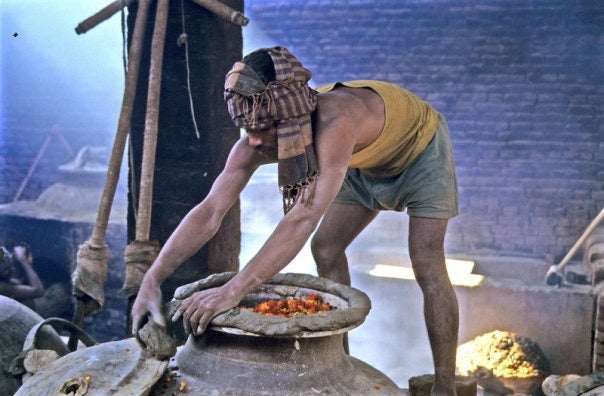
Every drop of attar drips with labour you’ll never see
Share
Attars are sold as ancient luxury. Romantic stories swirl around Kannauj — “India’s perfume capital” — where copper stills bubble and rare oils drip out drop by drop. But peel back the glossy narrative, and you find something else entirely: exhausted workers, vanishing forests, endangered sandalwood, and an industry clinging to a method that belongs in the past.
The Myth of “Heritage Craft”
Attars are still made using the deg–bhapka method, a copper cauldron heated by fire, feeding vapors into a receiver cooled in water. It sounds poetic — but here’s the truth:
• It’s labour-intensive: entire teams spend long hours tending the fires, checking temperatures, and waiting weeks for one batch.
• It’s time-intensive: a single distillation can drag on for days or months.
• And in today’s world of exploitative labour practices, who pays the price? Not the brands who romanticize the story. It’s the workers sweating by the stills, often with no protections, no contracts, no living wage.
The “heritage” mask hides the reality: heritage for whom, and at whose expense?
Sandalwood: The Industry’s Dirty Addiction
Every true attar rests on a sandalwood base. But sandalwood isn’t what it used to be.
• Indian sandalwood (Santalum album) has been poached, smuggled, and logged almost to extinction.
• Prices have skyrocketed. Counterfeits flood the market.
• Entire forests are stripped bare, just so a few drops of oil can carry a perfume.
Brands still whisper the word “sandalwood” like it’s sacred. But the truth? Every drop today comes at the cost of either an endangered tree or a planet choking on illegal trade.
Oud: Extinction Bottled
Then comes oud (agarwood) — hailed as “liquid gold.” Oud only forms when Aquilaria trees are infected by a rare mold. It can take decades. Instead of waiting, forests are hacked apart, stripped, and trafficked to meet global demand. This isn’t just unsustainable. It’s ecocide in a bottle.
Who Does the Work?
In Kannauj, families have distilled for centuries. The craft is real — but look at the conditions:
• Workers (called digha) spend days watching the stills, inhaling fumes, handling hot copper.
• Supporting labour — often migrants or locals with few options — fetch fuel, carry raw materials, scrub vats.
• There are no guarantees of fair pay, no social protections, no transparency.
So when brands wax lyrical about “heritage,” what they don’t say is: whose hands, whose lungs, whose backs made it happen?
The Heritage Industry Doesn’t Want You to Ask Questions
Why don’t most brands disclose their sources?
• Because they don’t want you to know if your sandalwood is counterfeit or smuggled.
• Because they don’t want you to know if your oud came from a forest that no longer exists.
• Because they don’t want you to see the labourers who keep the fires burning without contracts, without fair wages.
The industry thrives on secrecy. And consumers keep buying the story.
Let’s call it plainly:
• Unsustainable raw materials: sandalwood and oud are endangered, trafficked, and planet-destroying.
• Exploitative labour: artisanal doesn’t mean fair; it often means invisible workers, underpaid and unprotected.
• Inefficient production: deg–bhapka is glorified as “authentic,” but in reality, it burns time, resources, and lives.
This isn’t heritage. It’s hypocrisy.
The Antra Difference
At Antra Botanicals, we don’t romanticize cruelty or hide behind “tradition.”
• We do not use sandalwood or oud.
• We do not glorify a system built on exhaustion and extinction.
• We bottle scents that honor Mama Gaia — crafted on 100% organic jojoba oil, sourced transparently, cruelty-free, and sustainable.
Because no perfume, no matter how “authentic,” is worth destroying forests or breaking people. Because the future of fragrance isn’t about clinging to “heritage at any cost.” It’s about creating, protecting, and honouring life.
Antra Botanicals: scent without suffering.
